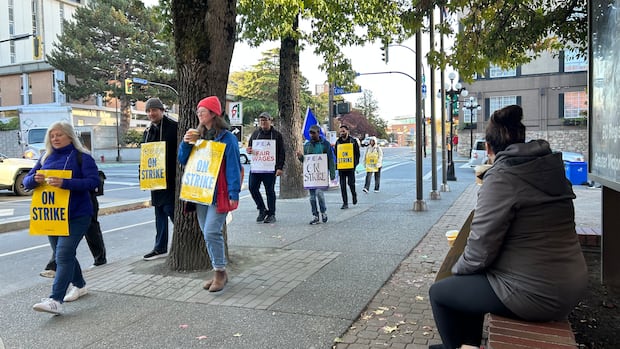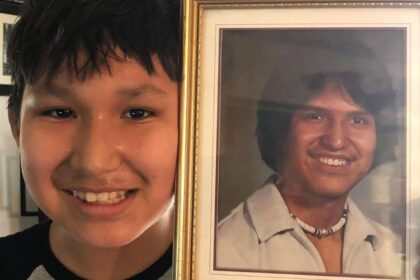British ColumbiaFor some B.C. General Employees’ Union members taking part in job action, the weeks-long pickets and lost wages are making it hard to make ends meet.Workers doing 4-hour picket line shifts earn $130 per day in strike payEmily Fagan · CBC News · Posted: Oct 15, 2025 9:00 AM EDT | Last Updated: 2 hours agoWorkers on a picket line outside of government offices on Blanshard Street in Victoria. (Emily Fagan/CBC)Cathy Ross spends four hours each weekday walking up and down the side of a street in Nanaimo, B.C., wearing a cardboard sign around her neck and, she says, feeling invisible.She’s one of the 25,000 B.C. General Employees’ Union (BCGEU) workers taking labour action who have set up picket lines at more than 470 worksites across the province since the strike began six weeks ago, pushing for higher wages. More than anything, Ross says she wants to return to her job helping people — but with negotiations at a standstill for weeks, it’s unclear when a deal will be reached.”It’s exhausting. Nothing is changing,” she said. “There’s a human cost to the inaction here, and I think we’re forgetting about that.”Workers cite financial, emotional toll of weeks-long strikeWhile the strike has sparked delays and disruptions to many services, affecting people across the province, it’s also come at a price to the workers on the picket lines.Workers receive strike pay, which is $130 for each day spent with four hours on the picket lines. It’s less than a minimum wage worker would make in a 40-hour work week, which those who have been out on strike since the start say has made it difficult to make ends meet — particularly in single-income households or double-income families with both earners on strike.More than 25,000 BCGEU workers are now taking part on job action across the province, as negotiations between the province and union have come to a standstill. (Emily Fagan/CBC)Leah Brown is a single mother in Nanaimo, volunteering as a strike team support worker while she’s on strike to help answer some of the thousands of questions that come into the union’s inbox each day.For her, strike pay is just enough to cover rent for the home she shares with her teenage daughter.”It’s tough,” said Brown. “Thanksgiving had to be scaled back, and I know Christmas is already going to be scaled back.”She said that picketing is mentally and physically exhausting for her and other workers, who long to return to the work they find fulfilling.”We’re very frustrated,” Brown said, “because the government has not come back to the table — like I feel like we are not valued.”In Victoria, where there are more than 60 strike locations at government offices, Crown corporations and public liquor stores, Shannon Butt is one of the hundreds of striking workers who gather outside the provincial offices on Jutland Road each day.”We are playing music, we’re having barbecues, we’re just together as a BCGEU family,” said Butt.Professional Employees Association (PEA) workers are on strike alongside members of the BCGEU, with many picket lines alongside or in proximity to each other in downtown Victoria. (Emily Fagan/CBC)While not everyone in the community is supportive, Brown said she’s seen many who are, with some sharing supportive messages, coffee and treats with the picket lines. “It picks up our spirits,” she said. “Just the honking, like it’s crazy how much that means to us.”Negotiations have not resumed since SeptemberIn a statement, Finance Minister Brenda Bailey said the province hopes to reach a deal that is fair to workers and everyone else in B.C.”We value our outstanding workers who deliver services British Columbians depend on,” said Bailey.”We know this strike isn’t easy — that’s why we are seeking a path back to the bargaining table to work on an agreement that offers government workers compensation that keeps up with inflation and offers more for lower-income earners.”The ministry has repeatedly declined to provide an estimate on how much the province has saved in the six weeks since the labour action began, and how much it has cost the province through the loss of liquor sales and other revenue.BCGEU president Paul Finch said he is ready to return to the table at any time, and urged the government to put forward a revised deal.Workers are pictured on a picket line on Blanshard Street in Victoria, outside provincial government offices. (Emily Fagan/CBC)”We’re now entering the seventh week of this strike, and the strain on our members is real,” Finch said in a statement.”Public service workers have shown extraordinary commitment and resilience, holding the line day after day because they know what’s at stake, not just for themselves, but for the communities they serve.”ABOUT THE AUTHOREmily Fagan is a journalist based in Victoria, B.C. She was previously a staff reporter for the Toronto Star. Her work has also appeared in publications including the Globe and Mail, Vice, and the Washington Post. You can send her tips at emily.fagan@cbc.ca.With files from Gregor Craigie
‘A human cost to the inaction’: BCGEU workers speak out on toll of weeks-long strike











